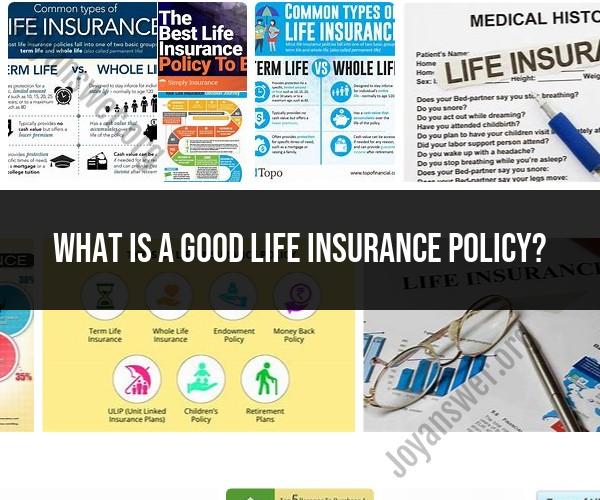What is a good life insurance policy?
A good life insurance policy is one that meets your specific financial needs and goals while providing adequate protection for your loved ones. To determine what constitutes a "good" life insurance policy, you should consider several important factors and assess how they align with your individual circumstances and objectives. Here are the key factors to consider when choosing a life insurance policy:
1. Coverage Amount (Death Benefit):
- Determine the amount of coverage (death benefit) your policy should provide. Consider factors like your outstanding debts, income replacement needs, future financial obligations (e.g., mortgage, education expenses), and the financial security of your dependents.
2. Type of Life Insurance:
- Decide between term life insurance and permanent life insurance (such as whole life or universal life). The choice depends on your coverage needs, budget, and whether you want to accumulate cash value within the policy.
3. Duration of Coverage:
- If you opt for term life insurance, select a term length that aligns with your coverage needs. Common terms are 10, 20, or 30 years. Permanent life insurance provides coverage for the insured's lifetime.
4. Premium Costs:
- Determine how much you can comfortably afford to pay in premiums. Ensure that the policy's premiums fit within your budget throughout the policy's duration.
5. Financial Strength of the Insurer:
- Choose an insurance company with a strong financial rating from agencies like A.M. Best, Standard & Poor's, and Moody's. This ensures the insurer can meet its obligations when it's time to pay the death benefit.
6. Policy Riders and Options:
- Review the availability of riders or optional coverage enhancements that can be added to the policy. Examples include critical illness riders, disability income riders, and accelerated death benefit riders.
7. Underwriting Process:
- Understand the insurer's underwriting process, including health evaluations, medical exams, and any pre-existing condition considerations. Your health and lifestyle may affect your eligibility and premium rates.
8. Cash Value Component:
- If considering permanent life insurance, assess the policy's cash value component. Understand how the cash value grows over time and how you can access it if needed.
9. Conversion Options:
- For term life insurance, check if the policy includes conversion options that allow you to convert to a permanent policy without a new medical exam if your needs change.
10. Policy Terms and Conditions:- Carefully read and understand the terms and conditions of the policy. Pay attention to exclusions, limitations, and any restrictions.
11. Financial Goals:- Consider how the policy aligns with your long-term financial goals, such as estate planning, wealth transfer, or charitable giving.
12. Review Periodically:- Periodically review your life insurance policy to ensure it continues to meet your evolving needs. Adjust coverage as necessary.
A "good" life insurance policy is highly individualized and tailored to your unique financial situation and objectives. It should provide peace of mind knowing that your loved ones will be financially protected in the event of your passing. To make an informed decision, consult with a licensed insurance agent or financial advisor who can provide personalized guidance based on your needs and circumstances.












